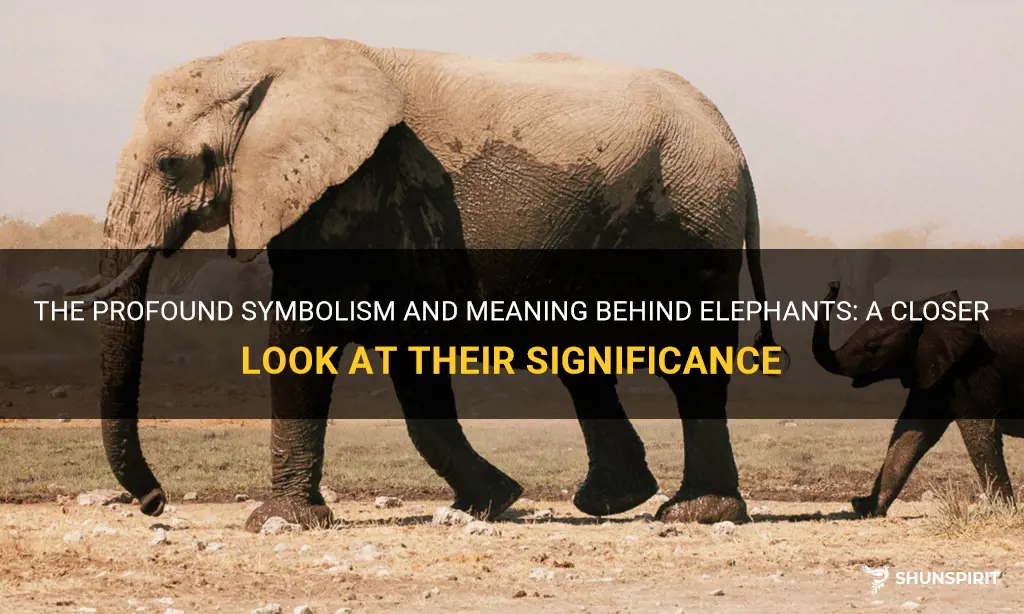
Elephants have long been revered and idolized across various cultures for their strength, wisdom, and loyalty. With their massive size and graceful presence, these majestic creatures have earned their place as powerful symbols in symbolism. From representing intelligence and memory to embodying spirituality and good fortune, the symbolism surrounding elephants is as diverse as the cultures that venerate them. Whether seen as a protector, a symbol of luck, or a messenger of the divine, elephants hold a deep and profound significance that continues to captivate and inspire. In this article, we will delve into the rich symbolism and meaning behind elephants, exploring the cultural and spiritual significance these magnificent creatures hold.
What You'll Learn
- What is the significance of elephants in various cultures and religions around the world?
- What are some common symbolic meanings associated with elephants?
- How do elephants symbolize strength and power?
- What are some examples of elephant symbolism in literature and art?
- How do different cultures interpret and understand the symbolism of elephants differently?

What is the significance of elephants in various cultures and religions around the world?
Elephants have held great significance in various cultures and religions around the world throughout history. These majestic creatures, with their large size, intelligence, and unique characteristics, have captivated the human imagination and have become symbols of strength, power, wisdom, and spirituality.
In many Asian cultures, particularly in countries like India, Thailand, and Sri Lanka, elephants are revered as sacred animals. They are considered to be the embodiment of several deities and are often associated with royal and religious ceremonies. In Hinduism, the god Ganesha, the remover of obstacles, is depicted with the head of an elephant. Ganesha is worshipped by millions of people as the god of wisdom and prosperity, and his image is prominently displayed in temples, households, and rituals. In Thailand, elephants have been an integral part of religious rituals and ceremonies for centuries. They are highly revered and are used in processions and festivals to carry sacred objects and icons.
Besides their association with religion, elephants also hold symbolic meaning in various cultures. In African traditions, elephants are beloved creatures that are often associated with bravery, loyalty, and wisdom. They are seen as protectors and wise elders, and their images are commonly used in art, folklore, and storytelling. African tribes believe that elephants possess a deep understanding of the natural world and are capable of communicating with higher powers.
In addition to their symbolism in religion and culture, elephants are also highly regarded for their physical abilities and characteristics. Their immense size and strength have made them symbols of power and authority in many societies. Ancient civilizations, such as the Greeks and Romans, associated elephants with military prowess and used them in warfare. Hannibal, the Carthaginian general, famously used elephants in his military campaigns against Rome, leaving a lasting impression on the world.
Moreover, elephants are known for their intelligence, emotional depth, and social bonds, which have contributed to their significance in various spiritual and philosophical beliefs. In Buddhist teachings, elephants are seen as exemplifying patience, compassion, and mindfulness. The Buddhist concept of "elephant mind" refers to an unshakable calm and awareness amidst the chaos of life. Elephants are highly social animals with strong family bonds, and their cooperative and nurturing behavior is often viewed as a lesson for human society.
Overall, elephants hold immense significance in different cultures and religions around the world. From their association with deities and religious ceremonies to their symbolic meaning of strength, wisdom, and spirituality, these magnificent creatures continue to inspire awe and admiration in people across the globe. Their significance serves as a reminder of the intricate relationship between humans and the natural world, and the need to protect and respect these incredible creatures.
The Hidden Symbolism Behind the Predator Symbol: Unveiling its Deeper Meaning
You may want to see also

What are some common symbolic meanings associated with elephants?
The majestic and intelligent elephant has been a symbol of various meanings across different cultures and religions for centuries. It is a creature that is often regarded with respect and admiration, and its symbolism is deeply rooted in tradition and folklore. Here are some common symbolic meanings associated with elephants:
- Wisdom and intelligence: Elephants are known for their impressive mental capabilities and long memories. In many cultures, they are seen as a representation of wisdom and intelligence. Their ability to navigate long distances and their complex social structures have earned them a reputation for being wise creatures.
- Strength and power: Elephants are one of the largest and most powerful land animals, capable of immense strength. They are revered for their physical prowess, which often translates into symbolic representations of strength and power. In some cultures, elephants are seen as protectors and guardians due to their size and strength.
- Good luck and prosperity: The elephant is considered a harbinger of good fortune and prosperity in many cultures. This belief is particularly strong in Asian cultures, where the elephant symbolizes luck, wealth, and wisdom. Statues or images of elephants are often placed at the entrances of homes or businesses to invite good fortune.
- Loyalty and family: Elephants are known for their strong social bonds and close-knit family units. They often symbolize loyalty, unity, and family values. This symbolism can be seen in various cultural contexts, where elephants are associated with the importance of strong familial ties and the protection of loved ones.
- Spiritual and religious significance: Elephants hold significant spiritual and religious symbolism in various traditions. In Hinduism, the elephant-headed deity Ganesha is revered as the remover of obstacles and the god of wisdom and prosperity. The white elephant holds great spiritual significance in Buddhist traditions and is associated with enlightenment and purity.
- Endurance and resilience: Elephants are known for their ability to endure long journeys and overcome adversity. Their resilience and determination in the face of challenges make them symbolic of perseverance. They represent the idea of staying strong and steadfast in the face of obstacles.
In conclusion, elephants hold various symbolic meanings in different cultures and religions. They are often seen as wise, powerful, and lucky creatures, symbolizing strength, loyalty, and prosperity. Furthermore, elephants have significant spiritual and religious significance, representing endurance, resilience, and the importance of family. The symbolic meanings associated with elephants offer a glimpse into the deep reverence and admiration people have for these magnificent animals.
Decoding the Symbolism: Exploring the Meaning Behind Linkedin Symbols
You may want to see also

How do elephants symbolize strength and power?
Elephants are often seen as symbols of strength and power in many cultures around the world. These magnificent creatures embody qualities that are often associated with dominance and authority. From their large and imposing stature to their impressive physical capabilities, elephants have long been admired for their exceptional strength.
One of the reasons why elephants symbolize strength and power is due to their sheer size. These animals are the largest land mammals, with adult males weighing up to six tons and standing over ten feet tall at the shoulder. Their massive size alone commands respect and creates a sense of awe. It is this remarkable physical presence that contributes to their association with power.
Furthermore, elephants are known for their incredible strength. They possess a tremendous amount of muscle mass, particularly in their trunks and tusks, which allows them to perform remarkable feats of strength. For instance, elephants can uproot trees with their trunks and tusks, showcasing their enormous power. This ability to effortlessly manipulate their environment speaks volumes about their strength and adaptability.
Besides their physical attributes, elephants also exhibit traits that further reinforce their symbolism of strength and power. These animals are highly intelligent and possess exceptional memory capacity. They are renowned for their strong family bonds and their ability to protect their young and herd members. This protective nature and loyalty are often associated with traits of strength and power.
In many ancient cultures, elephants have been revered as symbols of leadership and authority. Their association with strength and power is often reflected in various artworks, sculptures, and architectural structures. For example, the Hindu god Ganesha, depicted with the head of an elephant, represents wisdom, knowledge, and the removal of obstacles. This portrayal emphasizes the connection between elephants and strength.
Furthermore, elephants are often used as symbols of power and authority in heraldry and coats of arms. Many royal families and noble houses incorporate elephants as symbols in their family crests, signifying their strength, nobility, and dominion. This usage of elephants as symbols of power has become ingrained in our societal consciousness, further solidifying their association with strength and authority.
In conclusion, elephants symbolize strength and power due to their impressive physical attributes, such as their size and strength. They are also known for their intelligence, loyalty, and protective nature, which further reinforce their symbolism of strength. Through their representation in various cultural and artistic contexts, elephants have become iconographic symbols of power and authority. Their symbolism extends beyond their physicality to encompass qualities of leadership and dominance that have captured the human imagination for centuries.
The Significance and Symbolism of Waves as a Universal Symbol
You may want to see also

What are some examples of elephant symbolism in literature and art?
Elephants have long been revered as powerful and majestic creatures, symbolizing various qualities depending on the cultural context. In literature and art, elephants often serve as symbols of strength, wisdom, loyalty, and spirituality. They can also represent longevity, fertility, and abundance. Here are some notable examples of elephant symbolism in literature and art.
One of the most famous examples of elephant symbolism is found in George Orwell's novel "Animal Farm." In this allegorical tale, Orwell uses various animals to represent different aspects of the Russian Revolution and subsequent Soviet Union. The character named Boxer, an incredibly strong and loyal cart horse, is often associated with the elephant. Boxer's unwavering work ethic and determination symbolize the proletariat's struggle and their exploitation by the ruling elite.
Another example of elephant symbolism can be found in Rudyard Kipling's collection of stories, "The Jungle Book." In the story "Toomai of the Elephants," Kipling portrays elephants as mystical creatures with a deep connection to the spiritual realm. The young protagonist, Toomai, is granted the rare privilege of witnessing an elephant dance, which is considered a sacred and awe-inspiring event. The elephants' grace and majesty in this story represent a higher power, spirituality, and the awe-inspiring wonders of the natural world.
In Hindu mythology, the elephant-headed deity Ganesha is one of the most widely worshipped gods. Ganesha's elephant head symbolizes his intelligence and wisdom, while his round belly represents abundance and prosperity. He is regarded as the remover of obstacles and the god of new beginnings, making him a popular figure in art and literature.
In ancient Chinese culture, elephants were associated with power, dignity, and strength. They were often depicted in artwork and religious rituals, symbolizing the emperor's authority and the wealth of the nation. The famous "Elephant Clock" created during the Ming Dynasty is an intricate mechanical clock that served as a symbol of the emperor's power and the nation's prosperity.
In African literature, elephants often symbolize the interconnectedness of all living beings and the importance of preserving nature. African authors often use elephants as a metaphor for the continent's rich history and cultural heritage. Elephants' intelligence, social bonds, and their unique ability to communicate over long distances are celebrated as a reflection of Africa's wisdom and resilience.
Overall, elephants have a rich and diverse symbolism in literature and art. They can represent strength, wisdom, loyalty, spirituality, abundance, and much more. Whether portrayed as majestic creatures with a deep connection to the spiritual realm or as symbols of power and authority, elephants continue to captivate and inspire artists and writers around the world.
Unraveling the Hidden Meanings: Decoding the Symbols of Freedom
You may want to see also

How do different cultures interpret and understand the symbolism of elephants differently?
The symbolism of elephants varies greatly across different cultures. In some cultures, elephants are seen as a symbol of strength and power, while in others they hold religious or spiritual significance. Let's explore how different cultures interpret and understand the symbolism of elephants differently.
In many Asian cultures, particularly in India, elephants hold a prominent place in religious and cultural ceremonies. They are considered sacred animals and are associated with various deities. In Hinduism, the elephant-headed god Ganesha is worshipped as the remover of obstacles and the patron of arts and sciences. The symbolism of elephants in Hinduism represents wisdom, knowledge, and intellect. This association stems from the elephant's reputed ability to remember and recall even the most minute details.
In some African cultures, elephants are revered for their strength, intelligence, and familial bonds. They are considered symbols of wisdom, longevity, and protection. The African elephant is often depicted as a wise and powerful creature, bringing good luck and prosperity. In some tribes, elephants are even believed to hold the souls of their ancestors.
In Buddhist cultures, elephants symbolize mental strength, patience, and longevity. The Buddhist tradition tells stories of the Buddha's previous lives, and elephants play significant roles in these stories, representing virtues such as compassion and mindfulness. The white elephant is also considered a sacred symbol of fertility, purity, and prosperity in Buddhism.
In Western cultures, elephants are sometimes associated with intelligence and memory, similar to their symbolism in Hinduism. This may be due to the popular notion that elephants have exceptional memory capabilities and exhibit complex social behaviors. Elephants are often used as symbols of memory in literature and art.
In conclusion, the symbolism of elephants varies across different cultures. While they are universally recognized as powerful and majestic beings, their symbolic meanings differ depending on the cultural context. From representing wisdom and knowledge in Hinduism to symbolizing protection and longevity in African cultures, elephants hold diverse interpretations and understandings across the globe. The symbolic significance of elephants in each culture provides insight into the values, beliefs, and traditions of the people who incorporate these magnificent creatures into their cultural narratives.
Exploring the Enigmatic Symbolism of Blue Oyster Cult: Unveiling Hidden Meanings
You may want to see also
Frequently asked questions
In many cultures, the elephant is seen as a symbol of strength, power, and wisdom. In Hinduism, the elephant-headed god Ganesha is worshipped as the remover of obstacles and the bringer of good fortune. In Buddhism, the white elephant is considered sacred and represents the Buddha's birth and early life. In African cultures, the elephant is often seen as a symbol of fertility, abundance, and community.
In Western cultures, the elephant is often associated with loyalty, patience, and memory. It is also seen as a symbol of good luck, especially if the trunk is raised. The phrase "an elephant never forgets" is commonly used to describe someone with a strong memory or the ability to remember important details.
In dreams, elephants can have various symbolic meanings depending on the context. Generally, seeing an elephant in a dream can represent strength, stability, and guidance. It may also indicate a need to be more patient and persistent in facing challenges. In some cases, a dream about an elephant may suggest the need for emotional or spiritual growth.
Throughout history, the elephant has been a popular subject in art and literature. It is often depicted as a majestic and powerful creature, representing noble qualities such as courage, wisdom, and resilience. In many stories and fables, elephants are portrayed as wise and compassionate beings who offer guidance and protection. In contemporary art, the elephant is sometimes used to symbolize environmental conservation and the importance of preserving wildlife.







